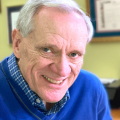I woke up in the middle of the night with Vietnam on my mind, unable to sleep. Like millions, I’ve been watching the Ken Burns/Lynn Novick PBS special The Vietnam War, and it touched nerves that still feel very alive. Those who served in Vietnam live with scars hard to imagine — those, like me, who protested Vietnam have searing memories. To watch the PBS special feels like undergoing corporate psychoanalysis, bringing suppressed experience and unresolved emotional baggage freshly into the light.
Vietnam changed my politics, my theology, and my life. Raised in a conservative evangelical cocoon that co-mingled God and country without a thought, nothing prepared me for the truth I discovered about this war. In 1967, graduating from a moderately parochial Christian college, all I knew was that a lot of U.S. soldiers were fighting an ugly war against communism in South Vietnam. At Princeton Seminary, I decided to learn about this conflict. As The Vietnam War shows, it didn’t take much to see the truth: A largely nationalist movement within a communist shell was fighting against outside powers, who were propping up artificial regimes. Put another way, the U.S. military, deployed in horrific ways, was engaged in an unjust war.
In confronting the realities of Vietnam, I began to read the Bible with honest eyes and grasp the gospel’s call to radical love. My choice to follow the way of Jesus rather than live by proof texts resulted from confronting the conflicting and sobering realities of Vietnam.
Searching for a way to make a difference in those years, I had the audacity to ask new U.S. senator Mark O. Hatfield (R.-Ore.) — an evangelical and a steadfast opponent of the war, a combination otherwise unheard of — if I could be an intern in his office. I soon found myself as chief assistant in his efforts to protest the war and to explain his faith to a dubious evangelical community.
For me, Vietnam became a moral litmus test, and my judgments were harsh. With the Cambodian invasion, and the Kent State and (largely ignored) Jackson State killings, it was clear that the U.S. government had lied and was using its power without moral restraint to impose its will, both abroad and at home. With Senator George McGovern (D-S.D.), Sen. Hatfield led an effort in the Senate to cut funds for the war. I was at his side on the Senate floor as the votes were cast in a narrow defeat. To this day, I can recall the names of each Senator who voted no, and I have never forgiven them.
My confession is that those political wounds in my heart have not healed.
The public and some members of Congress continued to oppose Nixon’s policies, which expanded the war’s scope and ferocity while gradually withdrawing U.S. troops. Wanting to see the war for myself, I traveled to Vietnam and Cambodia. There, I met with courageous Mennonite volunteers offering medical aid to all sides in dangerous areas, joined a press conference with Vietnamese students opposing President Thieu, and spent a long evening in Phnom Penh with a veteran journalist. At no point did I see a Niebuhrian “just war.” The entire enterprise was a moral disgrace.
The most damning revelation from the Burns/Novick documentary is how Nixon’s political fortunes drove our negotiations — and lack thereof — with the North Vietnamese, costing tens of thousands of lives. Unlike some anti-war activists, I didn’t idealize the North Vietnamese, but I did go and talk with them. On behalf of Senator Hatfield, a close colleague and I once met with a North Vietnamese diplomat in Paris to assess, under the radar, whether a humanitarian release of non-military POWs might be possible. That diplomat, though unflinching in his stance, was well-informed, ready to discuss our concern, and willing at least to negotiate.
Yet Nixon intervened, prior to the 1968 election, to prevent similar discussions toward a peace settlement — an action now viewed as treasonous. The crass and cynical dialogue between Nixon and Kissinger captured in the documentary displayed our leaders’ recognition that the Saigon government would fall — and their decision to delay that fact for political expediency. Bombs continued to fall with more destructive power than ever, and casualties mounted. No one has ever been held accountable.
One evening, while preparing a background memo for Sen. Hatfield to use the next day at a congressional hearing with Henry Kissinger, I was wracked with doubt. How could I, a 26-year-old kid, believe that I had the ideas, wisdom, and insight sufficient to suggest questioning officials with vast knowledge, experience, and access to classified information? I didn’t have better information, facts, or statistics. But I realized, then, that what was at stake was a moral judgment about the war. The U.S.’ policies toward Vietnam, and their implementation by the Nixon administration, showed a fundamental lack of moral aptitude. On that basis, both Sen. Hatfield and I were as qualified to make judgements as Henry Kissinger.
My Christian faith grounded me in that conviction, and shaped the moral judgements I went on to offer. It also instilled in me a conviction that our political process and our leaders need, above all, a moral compass. Without it, the power of government is capable of inflicting great evil, as we did in Vietnam.
We find ourselves today faced by another administration painfully and woefully lacking in moral aptitude. Resisting the multiple transgressions of the Trump administration, in my view, depends most of all on a foundation of moral clarity — judgments that any of us are qualified to make. When dealing with the health of our citizens, of our environment, and of others around the world, our response must begin with conviction and moral clarity. We must remember what our faith traditions teach and expect, and what the common good of society requires. That’s the word that needs to be heard.
The lessons of Vietnam are still being learned. Today, they can teach us that leaders lacking a moral compass are capable of great evil. Our response must come from our awakened moral conscience. We must support moral convictions’ public expression in political, legislative, and judicial actions that serve to constrict and shape the actions of an administration. That did, after all, finally, painfully, happen with our war in Vietnam.
Got something to say about what you're reading? We value your feedback!







